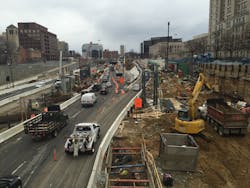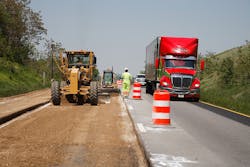Report: Local governments aim to fill infrastructure funding gap
The trucking industry and U.S. taxpayers as a whole should prepare themselves to face more “localized” taxes and fees, according to a new report as city and county governments try to generate infrastructure funding to repair road, transit, and water/wastewater systems.
In a conference call with reporters yesterday, Clarence Anthony, executive director and CEO the National League of Cities (NLC) dubbed this localized funding push the “new federalism” as local governments have assumed a greater responsibility to meet their infrastructure needs, though much of this “devolution of responsibility” is occurring without authority to raise funds locally – something he said must change.
“A new federalism – where cities are leading in addressing the nation's most critical challenges – is emerging," Anthony explained, adding that though 80% of Americas now reside in cities, “their bridges are crumbling, their roads are full of potholes, and they are being poisoned by their drinking water.”
Yet though cities are increasingly responsible for much of the nation's infrastructure, “most states limit the ability of localities to raise revenues to meet their communities' needs,” he stressed. “It's critical that local governments have the funding and decision-making authority they need to bring our infrastructure into the 21st century, and enable American cities to be competitive on the global stage."
U.S. Transportation Secretary Anthony Foxx also commented on the group’s new report – entitled Paying for Local Infrastructure in a New Era of Federalism – noting that funding transportation needs is now an effort that must be shared by federal, state, and local governments.
“Efforts at the federal, state, and local level have ab incredible ability to strengthen pathways to jobs and improve quality of life through transportation,” he said. “We need everyone engaged to communicate and collaborate so infrastructure solutions meet needs of our communities.”He added that “where we go, opportunities go; where we don’t, opportunity doesn’t; that is the important role of transportation in our communities.”
Christiana McFarland, the NLC’s research director and primary author of its new infrastructure report, said that “new federalism” defines a “new reality” of the relationship between cities and state/federal government.
“It means cities are taking lead in the face of declining [federal and state] funding and misaligned priorities,” she explained. “This is forcing cities to take the leads [in developing] local options sales taxes, fees, and special-purposed levies at the city and county level – usually for transportation needs.”
Mayor Mark Stodola of Little Rock, AR, noted that “in an era of declining revenues, cities cannot wait for federal government see what it will try and do; local citizens need to provide funding for variety of improvements.”
Stodola added that when he took office four years ago, the only way to obtain funding for transportation projects was to legislate a 3/8ths of a penny increase in the local option sales tax, which generated $72 million to meet street and drainage needs. A 3 cent boost to local property taxes brought in over $105 million.
“But we have over $1 billion in needs to fund,” Stodola pointed out. “We have 500 cities that have not resurfaced their roads in 15 years. This is a public safety issue.”
Chris McKenzie, executive director of the League of California, said 80% of the golden state’s road network is within cities and counties, but they have a $99 million dollar backlog in projects to fund.
“To say that this is a new era of federalism is an understatement,” he stressed. “Now more than ever we need more local sources of funding. This year alone we have 12 elections at the county level regarding increasing transportation sales taxes.”
In California’s case, McKenzie said a quarter of its transportation funds come from state funds, another quarter from federal funds, with revenues from the golden state’s “cap and trade” program providing some funding for public transit needs. Filling the remaining 50% is why localities need to start issuing more taxes and fees.
“If wait 5 years to raise gas taxes, we’ll need to raise them 10 cents per gallon to make up the shortfall,” McKenzie explained. “Cities can’t be restrained by 100 year-old laws that don’t recognize the needs we have. Many state governments are decades behind systemic capital improvement planning; they don’t respond until facilities fail and of course that’s a very ineffective way to run a capital improvement plan.”
About the Author
Sean Kilcarr
Editor in Chief
Sean Kilcarr is a former longtime FleetOwner senior editor who wrote for the publication from 2000 to 2018. He served as editor-in-chief from 2017 to 2018.

